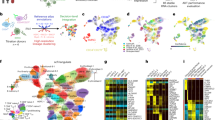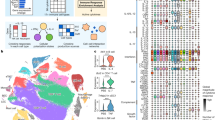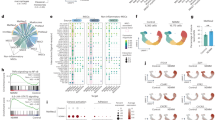Abstract
Inhibin is a hypophysiotropic hormone which selectively suppresses the secretion of pituitary follicle-stimulating hormone. It has been isolated from gonadal fluids and characterized as a protein heterodimer consisting of an α subunit and one of two β subunits (βA or βB)1–4. FSH-releasing protein (FRP), also named activin, is a dimer consisting of two inhibin β-chains5–6. A factor from conditioned medium of a leukaemia cell line has been isolated which can induce mouse Friend cells to become benzidine-positive, and which shares a similar N-terminal sequence with porcine FRP7. In this report, we find that FRP and inhibin modulate both the induction of haemoglobin accumulation in a human erythroleukaemic cell line, K562, and the proliferation of erythroid progenitor cells in human bone marrow culture. These two proteins could constitute a novel humoral regulatory control of erythropoiesis which would involve two types of related protein dimers with functionally opposite effects.
This is a preview of subscription content, access via your institution
Access options
Subscribe to this journal
Receive 51 print issues and online access
$199.00 per year
only $3.90 per issue
Buy this article
- Purchase on Springer Link
- Instant access to full article PDF
Prices may be subject to local taxes which are calculated during checkout
Similar content being viewed by others
References
1. Robertson, D. M. et al. Biochem. biophys. Res. Commun. 126, 220-226 (1985). 2. Miyamoto, K. el al. Biochem. biophys. Res. Commun. 129, 396-403 (1985). 3. Rivier, J., Spiess, J., McClintock, R., Vaughan, J. & Vale, W. Biochem. Biophys. Res. Commun. 133, 120-127 (1985). 4. Ling, N. et al. Proc. natn. Acad. Sci. U.S.A. 82, 7217-7221 (1985). 5. Vale, W. et al. Nature 321, 776-779 (1986). 6. Ling, N. et al. Nature 321, 779-782 (1986). 7. Eto, Y. et al. Biochem. biophys. Res. Commun. 142, 1095-1103 (1987). 8. Lozzio, C. B. & Lozzio, B. B. Blood 45, 321-334 (1975). 9. Rutherford, T. R., Clegg, J. B. & Weatherall, D. J. Nature 280, 164-165, (1979). 10. Jokinen, M., Gahmberg, C. G. & Andersson, L. C. Nature 279, 604-607 (1979). 11. Fukuda, M. Nature 285, 405-407 (1980). 12. Rowley, P. T., Betsy, M. O. & Barbara, A. F. Blood 65, 862-868 (1985). 13. Tsiftsoglou, A. S., Gusella, J. F., Vollock, V. & Housman, D. E. Cancer Res. 39, 3849-3855 (1979). 14. Sokal, R. R. & Rohlf F. J. in Biometry 321-371 (Freeman, San Francisco, 1981. 15. Metcalf, D. Science 229, 16-22 (1985). 16. Mason, A. J. et al. Nature 318, 659-663 (1985). 17. Mayo, K. E. et al. Proc. natn. Acad. Sci. U.S.A. 83, 5849-5853 (1986). 18. Orkin, S. H., Harao, P. I. & Leder, P. Proc. natn. Acad. Sci. U.S.A. 72, 98-102 (1975). 19. Ogawa, M. Parmley, R. T. Bank, H. L. & Spicer, S. S. Blood 48, 407-417 (1976). 20. Singh, M. K. & Yu, J. Nature 309, 631-633 (1984). 21. Hsu, S. M., Raine, L. & Fanger, H. Am. J. din. Pathol. 75, 734-738 (1981).
Author information
Authors and Affiliations
Rights and permissions
About this article
Cite this article
Yu, J., Shao, Le., Lemas, V. et al. Importance of FSH-releasing protein and inhibin in erythrodifferentiation. Nature 330, 765–767 (1987). https://doi.org/10.1038/330765a0
Received:
Accepted:
Issue Date:
DOI: https://doi.org/10.1038/330765a0
This article is cited by
-
Activin-A is elevated in patients with thalassemia major and double heterozygous sickle cell/beta-thalassemia and correlates with markers of hemolysis and bone mineral density
Annals of Hematology (2019)
-
Where Does Lenalidomide Fit in Non-del(5q) MDS?
Current Hematologic Malignancy Reports (2015)
-
An activin receptor IIA ligand trap corrects ineffective erythropoiesis in β-thalassemia
Nature Medicine (2014)
-
Transforming growth factor-β superfamily ligand trap ACE-536 corrects anemia by promoting late-stage erythropoiesis
Nature Medicine (2014)
-
Activin A suppresses interleukin-1-induced matrix metalloproteinase 3 secretion in human chondrosarcoma cells
Rheumatology International (2007)
Comments
By submitting a comment you agree to abide by our Terms and Community Guidelines. If you find something abusive or that does not comply with our terms or guidelines please flag it as inappropriate.



